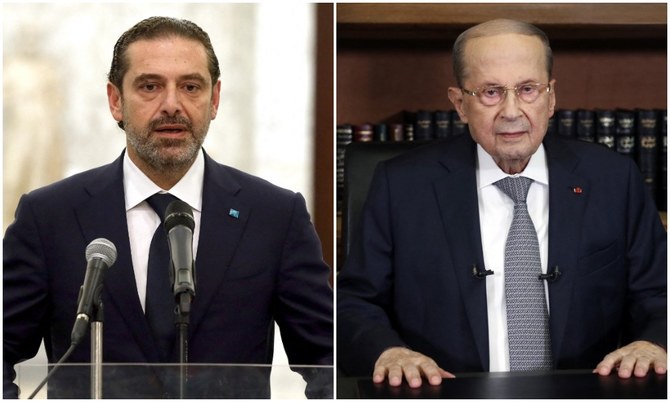BEIRUT: A critical meeting on Monday between Lebanese President Michel Aoun and Prime Minister-designate Saad Hariri on the country’s uncertain future failed to reach an agreement.
The 18th meeting between the two men, held at the Presidential Palace, was met before and after with pessimism by much of the Lebanese public.
Hariri insists on forming a government of 18 independent specialists acting as ministers, without the capacity for a blocking third by any party, while Aoun and his Free Patriotic Movement (FPM) propose a government of 20 ministers, with the right to name 6 ministers in addition to an Armenian minister.
After Monday’s meeting, which lasted just 35 minutes, Hariri said that Aoun sent him on Sunday “a complete ministerial structure in which the portfolios were distributed among the sects and parties, along with a letter telling me that it is advisable to fill it out.
“The list includes a blocking third of his political team, whether the government consists of 18, 20 or 22 ministers.
“He asked me to suggest names for the portfolios according to the sectarian and party distribution that he had prepared.”
Hariri said that he told Aoun during the meeting that “this is unacceptable because it is not the prime minister—designate’s job to fill out lists prepared by anyone, and it is not the job of the president to form a government.
“Our constitution clearly says that the prime minister-designate forms the government and puts the names, and discusses his formation with the president of the republic.
As a result of this, Hariri said: “Accordingly, I respectfully informed him that I consider his letter as if it had not been sent. I returned it to him and informed him that I would keep a copy of it for history.”
Hariri said he previously suggested a government formation to Aoun more than 100 days ago, and told him: “I am ready for any proposals and amendments to names and portfolios. Even with his insistence on the Interior Ministry, I suggested a solution for him. Unfortunately, his answer was clear: The blocking third.”
Hariri added: “I have one goal, which is to put an end to the collapse and the suffering of the Lebanese. I asked the president to listen to the pain of the Lebanese and give the country its only and last chance for a government of specialists to implement reforms and stop the collapse without disruption or narrow partisan considerations.”
Hariri denied that he had previously provided Aoun with broad lines for his government. He distributed to the media the list of “specialized ministers” that he presented to Aoun on Dec. 9, requesting that “public opinion be the judge.”
The prime minister-designate did not respond to questions by the press, and no date has been set for a new meeting between the two parties.
Hariri’s suggested list included well-known academics and experts, including three women.
The Future Movement media coordinator, Abd Al-Salam Moussa, told Arab News: “Hariri thwarted the administration’s coup against the republic.”
After Hariri finished a speech at the Presidential Palace after the meeting, large swathes of protesters took to the streets of Beirut to express their anger, while electronic platforms that control the black market began to raise the dollar exchange rate again.
Earlier in the day, the exchange rate stood at 11,300 Lebanese pounds, but after Hariri’s statement, it spiked to 13,000 Lebanese pounds.
The 17th meeting between Aoun and Hariri last Thursday also complicated Monday’s meeting, making it difficult to reach a solution to Lebanon’s political crisis.
Maronite Patriarch Mar Bechara Boutros Al-Rahi, on the eve of Aoun and Hariri’s meeting, appealed to the two parties to “stop onerous conditions.”
He said: “If some want to burden the next government with the region’s conflicts and the race to the presidency, regime change and control of power, then that will lead to chaos, which will not show mercy to anyone, starting with its creators.”
Caution and public anxiety preceded the Aoun-Hariri meeting and increased after it.
Despite the reopening of restaurants and cafes on Monday, with strict health measures in place — two months after total lockdown began — the public chose to stay home.




























